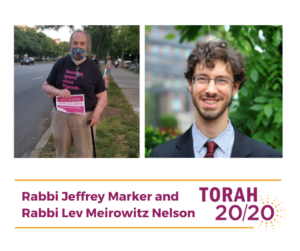Let’s review how Joseph exercises power once he achieves it in Egypt. He takes revenge on the brothers who sold him into slavery, by calling them spies and holding Shimon in prison. Then, after reconciling with them, he uses his position to enrich his family, giving them the fertile land of Goshen to settle in. (Gen. 45:18; 46:34) True, he skillfully manages Egypt’s agriculture during the seven years of plenty so that no one starves to death during the seven years of famine, but then he turns around and uses the national emergency as an excuse to acquire all of Egypt’s money, livestock, and land for Pharaoh — and ultimately the population as well, as serfs. You might even call it insider trading, using his secret knowledge of the future to turn a massive profit.
Hardly a paragon of virtue.
Looking back at Joseph’s story, we might have seen this coming. It seems that, throughout his life, Joseph’s loyalty flows upward toward the powerful figures who give him his power. In the initial childhood conflict with his brothers, Joseph brought bad reports regarding them to their father Jacob. (Gen. 37:2) When Potiphar’s wife tries to seduce him, Joseph’s refusal seems to center on loyalty to Potiphar more than any particular morality. He says:
“Look, with me here, my master gives no thought to anything in this house, and all that he owns he has placed in my hands. He wields no more authority in this house than I, and he has withheld nothing from me except yourself, since you are his wife.” (Gen. 39:8-9)
And even when Joseph finishes the thought with what might be an appeal to morality, it is again tinged with loyalty that flows upward to the ultimate source of Joseph’s good fortune: “How then could I do this most wicked thing, and sin before God?” It sounds an awful lot to us like, “If only God weren’t watching, then…”
Sign up to receive Torah 20/20 in your inbox each week.
It was Pharaoh who plucked Joseph from prison and elevated him to second-in-command (after God gave Joseph the ability to interpret dreams); therefore, it is completely in character for Joseph’s loyalty to be first and foremost to his new benefactor.
We might ask: Since Joseph is ultimately loyal to God, how can he do such a thing? How could God want an entire people enslaved to their king? Wouldn’t God have been better served by a kinder public policy?
As commentary on that question, we might look (uncomfortably, we might add) to Pat Robertson, who a week and a half ago declared on national television “that God almighty was gonna do a miracle and stop the theft of our election and the fraud that was being perpetrated on the American people, and that God himself [sic] would intervene.”
That is to say, we who align ourselves with T’ruah see ourselves as doing God’s work in the world by advancing human rights, by being allies to the marginalized, by standing up for every human being as created in the divine image. But Robertson and his allies also see themselves doing God’s work in the world — work that involves solidifying their own power and forcing their understanding of God on everyone else.
Interestingly, Joseph does not proceed on a campaign of evangelism to convert Egypt to worshipping God. In fact, he is deferential to the Egyptian priests and allows them to retain their land, perhaps out of a keen sense of realpolitik. He tests the limits of his power, and only when he finds them does he stop.
Find more commentaries on Parshat Vayigash
Jewish tradition calls Joseph “the Tzaddik, the Righteous One,” and Kabbalah even goes so far as to identify him as “Tzaddik Yesod Olam” — the Righteous One who is the Foundation of the World. But this strikes us as a whitewash. So far as we can tell, none of the classical commentators have anything critical to say about his behavior as viceroy of Egypt. Rabbi Arthur Waskow does in his first version of Godwrestling, which is not surprising. Years ago, he and one of us (Jeff) were part of a community, Fabrangen, in Washington D.C., where this would be a discussion every year: Was Joseph a good guy or a bad guy?
Perhaps the best we can say about Joseph is that he was traumatized as a child — orphaned when his mother died giving birth to his younger brother, attacked and sold into slavery by his brothers at the age of 17, framed and imprisoned for a crime he did not commit, forgotten by the royal cup-bearer whom he helped and left to rot in jail. We know that people who are abused often end up abusing others. Perhaps we can see Joseph’s single-minded devotion to power as clinging to self-preservation wherever he could find it.
That’s a little hard for us to square with Joseph the Tzaddik, whom God guided personally, but it does sound plausible.  It seems Joseph’s closeness with God didn’t give him the confidence and security he would have needed to heal from that trauma. And so he perpetuates it, and the stage is set for a new king to arise over Egypt who does not know Joseph.
It seems Joseph’s closeness with God didn’t give him the confidence and security he would have needed to heal from that trauma. And so he perpetuates it, and the stage is set for a new king to arise over Egypt who does not know Joseph.
Rabbi Jeffrey Marker has been involved with social justice issues since the 1960s. He has worked with Hillel, congregations, and in chaplaincy settings. He has affiliation with the Conservative and Jewish Renewal movements.
Rabbi Lev Meirowitz Nelson is Director of Rabbinic Training at T’ruah and editor of the Torah 20/20 series.

